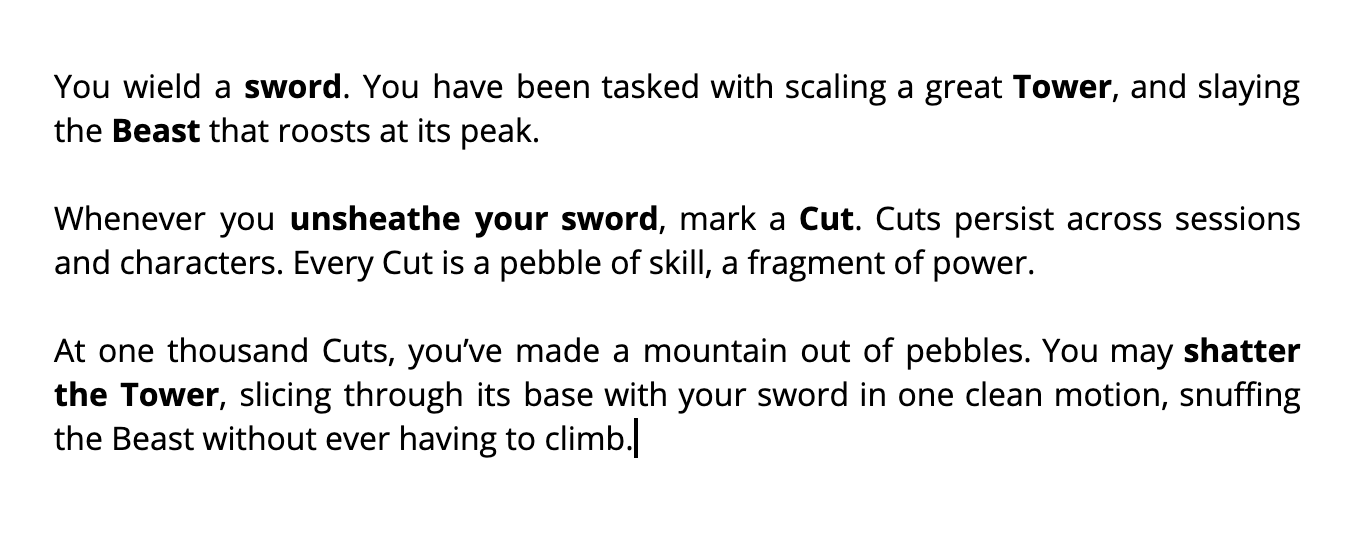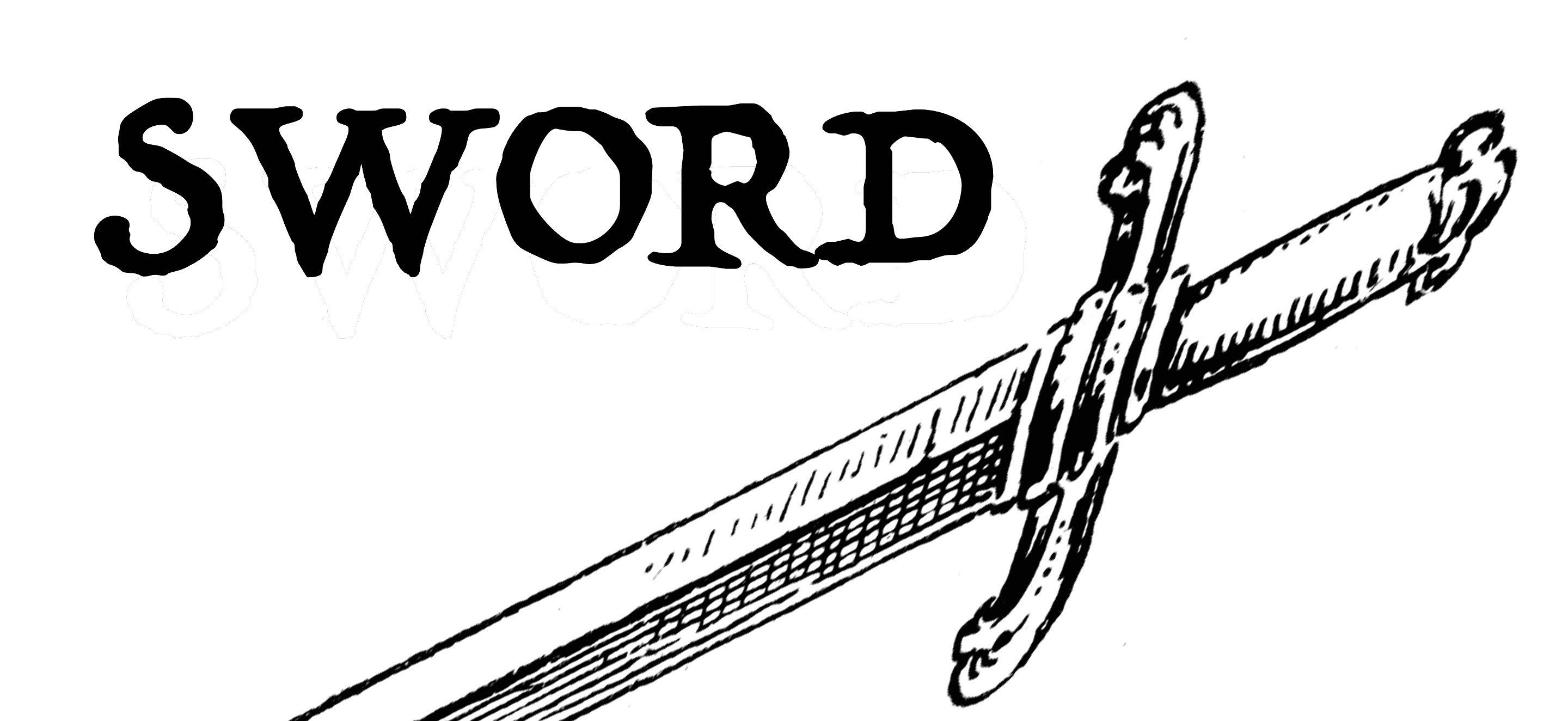Second Game, First Devlog
Hey y'all, so this is the first devlog I'll write about the second game I've ever written & released: SWORD. I wanted to put this out there in case anyone is interested in how I approached designing the game.
SWORD was borne from #MoveMonth, a game design challenge on Twitter that encourages writers & designers to write one move a day based on certain prompts for the entirety of August. The move I wrote for Day Three: A Thousand and Ones was the bones for what SWORD would become:
It had all the basic elements - the sword, Tower, Beast, the cuts which would become marks, the Mountain, and the final move. The first thing I thought of in regards to the post was "death by a thousand cuts", and thought about what it might mean to inflict such a death. I also wanted to convey a sense of progression, just not one you'd find in many TTRPGs. Cuts find many parallels to a lot of other games, specifically in terms of experience. I mean, they are basically points of experience, just dressed up differently.
I went to thinking about how the element of experience manifests in TTRPGs today. You've got your basics: killing monsters in hack-n-slash games. Other games might require certain conditions to be met - Powered by the Apocalypse requires players to fail rolls in order to gain experience, the idea being that one learns from their failures. Whatever the case may be, growth results from conflict: you gain experience as a result of meeting challenges, which is a pretty uncontroversial idea. There are of course other ways to approach experience; the wonderful Wanderhome (which is just about to end its Kickstarter go back now!!!) discards with the idea that challenge necessarily means growth; instead, characters can grow, can gain additional moves or depth, simply with the passage of time in the game.
However, there was one thing that kinda stuck with me about how old-school games approached experience. I've read somewhere that some of the earliest RPGs had it so that characters could gain experience for every piece of gold they looted on their adventure. I've seen some OSR-inspired games today use this idea as well, to incentivize players to grab as much gold and valuables as they can while clearing dungeons. But something doesn't really sit right with me about that. Adventures in these games often see players delving into ancient ruins & forgotten tombs, fighting against hordes of goblins or bandit-gangs. In addition to whatever goodies the baddies were able to accrue, these dungeons often have treasures of their own, and herein lies the problem: mechanics like experience-for-gold incentivize players to loot and pillage the places where they go, places that more often than not have nothing to do with their quest or mission, and serve merely as headquarters for the bad guys (it's not like the bandits built the Tomb of Seven Saints). It's another form of violence on top of the literal violence the players are also incentivized to enact, one that has deep ties to Western ideas of exploration & discovery that sees the settler-explorer as a mythic figure, uncovering riches in a great untouched land of opportunity, which is just wrong, and one that is yet another in a long tradition of icky tropes used in role-playing games.
SWORD is what I hope to be an ultimate distillation of this gold-for-experience mechanic: a mindless, monotonous exercise in futility. All the set dressing & elements that serve to distance one from the true nature of the act has been stripped away - who built the Tower? What is the Beast? Why do the elders fear it? What monsters lurk in the Tower? It doesn't matter, because that isn't the point. The point, at least in my opinion, is to illustrate the cycle of violence for what it truly is: meaningless. It is a Sisyphean endeavor, one that doesn't yield a triumphant ascent after hard work and due diligence, but just a return to the status quo. You come, you kill, you kill again and again and again - and after all that, you've changed, but not for the better. You're stronger than anything, but what good is that strength when it can only be turned to greater levels of violence?
That's also why I included the option to walk away. In all TTRPGs, that's always a possibility. You don't have to engage with the tools & mechanics as the game lays them out for you, and indeed many of the most memorable moments you can have while playing RPGs come from ignoring the main quest and just fucking around. That's also why games like Wanderhome are so important: they demonstrate that games can be about something other than violence and killing and looting, that you can envision spaces outside of what we know. I know this has gone waaaay off the rails and I probably sound very pretentious, but all this is kinda why I started designing games in the first place. It's a medium where every single element, from the prose to the mechanics themselves, have the potential to tell a story in and of themselves, and when it all comes together it can be beautiful.
No, I don't actually expect anybody to play SWORD (except, maybe, me,) but I hope those who read it find it an interesting thought-experiment, or an exercise in questioning why games are the way they are. Is there any reason I chose one thousand, and not one million? Why are the only choices to fight and to flee? I'm not sure, but they are interesting questions! The moral of the story is that games are cool and I love writing them. Thanks for reading, and if you have any thoughts or comments leave em down below! <3 Valentine
Files
Get SWORD
SWORD
A dream about Sisyphus.
| Status | Released |
| Category | Physical game |
| Author | polychromaic |
| Genre | Role Playing |
| Tags | Dreams, Experimental, solo, sword |

Leave a comment
Log in with itch.io to leave a comment.